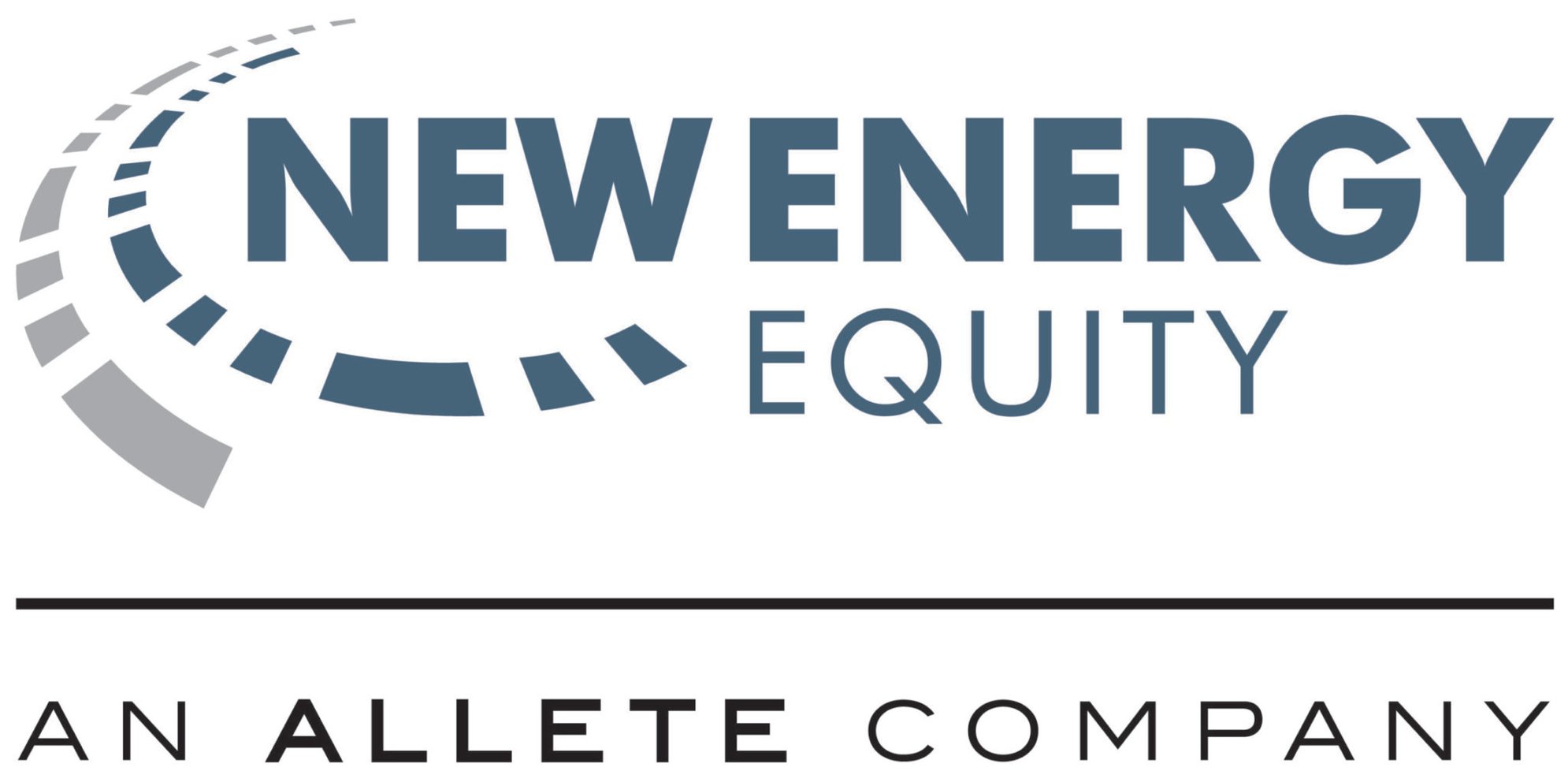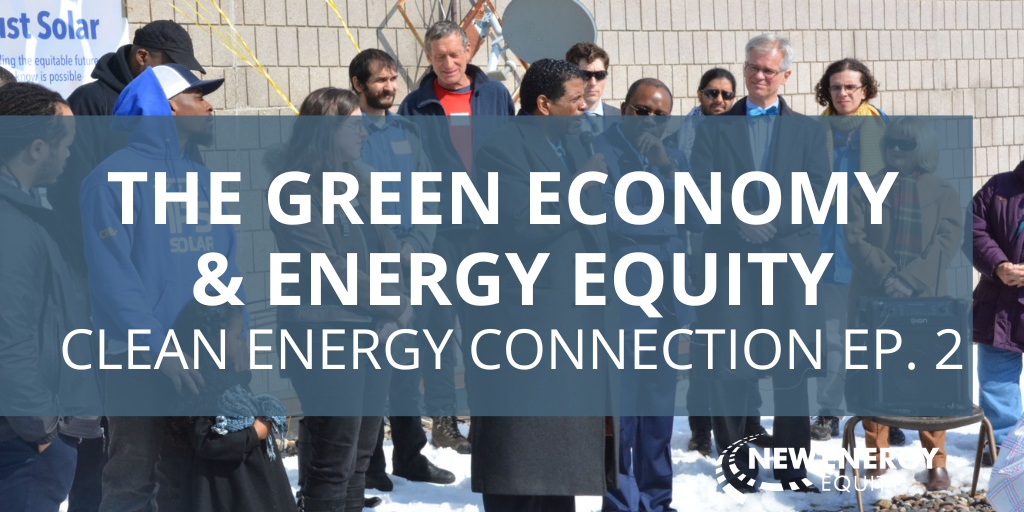New Energy Insights
- Home /
- New Energy Insights /
- The Green Economy & Energy Equity: Clean Energy Connection EP. 2
(Interview starts at 1:26:00)
Proponents of the Green Economy & Energy Equity: About the Guests
Audrey Henderson, Author, Energy News Network
Audrey is an independent writer and researcher based in the greater Chicago area with advanced degrees in sociology and law from Northwestern University. She specializes in sustainability in the built environment, culture and arts related to policy and related topics. Her work has been featured in Wallpaper magazine, the Chicago Reader, Chicago Architect magazine, Next City, Transitions Abroad, Belt Magazine and other consumer and trade publications.

Eric Pasi, Chief Development Officer, IPS
As Chief Development Officer for Impact Power Solutions, Pasi has helped organizations analyze and adopt clean energy strategies nationwide. He is extremely passionate about renewable power, entrepreneurship and the climate crisis. In 2020, he released his first book called “CleanWave: A Guide to Success in the Green Recovery” where he outlines the past, present, and future of clean tech, and its role in a post-COVID19 and post-George Floyd recovery.
Interview Transcript
Joan E: This segment of Joan Esposito: Live, local and Progressive is sponsored by Impact Power Solutions, the company that knows clean energy in Illinois and throughout the Midwest. Eric Pasi, the IPS Chief Development Officer, joins us and today we are also joined by Audrey Henderson, who's an independent writer and researcher. She's based in the Chicago area and she specializes in writing about sustainability. Hello, Eric. Hello, Audrey. Welcome to our broadcast.
Audrey H: Hello
Eric P: Good afternoon, Joan.
Joan E: One of the things that we were going to talk about today was the idea of energy and equity. Now, Audrey, I know that you've done a lot of research into sustainability. Has any of your research touched on this idea of trying to do clean energy in a way that is equitable? And if so, what have you found?
Audrey H: That's definitely become more prominent recently. As far as I'm concerned, energy and equity go hand in hand. What I've found is that energy now is thought of more as just more than just making cars more energy efficient or more gas efficient. It's really transitioning to a green economy, and adding more opportunity for people of color and people of lower income people to plug into, no pun intended, the economy.
Joan E: Audrey, can you or maybe you Eric, can you define our terms? Because I've got to tell you, when somebody says green economy, I'm not always sure exactly what they're talking about. So I need to know what you would define green economy as, and when you're talking about increasing jobs, particularly for underserved communities, what are we talking about as specific jobs? Are we talking about factories where solar panels are made? First of all, let's define green economy and then I want to know, specifically, what are one or two or three different jobs that kind of an economy would create?
Eric P: Yeah, absolutely. The green economy is a very broad big subject and encompasses everything from more efficient vehicles, as Audrey had mentioned, to energy generation (such as solar and wind) energy efficiency, and carbon capture smart technologies that help us consume energy in a smarter way and more efficiently. I think that is probably a good basis to start with a definition of the green economy.
Joan E: Audrey, give me some examples of how people would actually work in the green economy, what would they do?
Audrey H: Well, Eric is absolutely right. It is a broad term. When you mentioned factories where people are making solar panels, that would definitely qualify, but also what would qualify is green buildings, green materials, urban planning. I guess what I would try to convey is that when you think about a green economy, an opportunity, you have to think beyond cars being gas efficient. I'm not sure I'm answering your question.
Joan E: Let me give you guys one example. Recently, I had been thinking about an electric car for a while and then I decided to take the plunge. And some people are saying “Well, you know, that's great. That's the wave of the future.” And then I read articles that say “it's really not that great, because there's so many toxic minerals in the batteries, and then what do we do with the batteries?” and “are you really hurting the environment or saving the environment.” I don't have the depth of knowledge that you guys have on this subject. I get confused very easily. And frankly, I can't, at the end of the day sometimes, decide if I'm doing a good thing or not. Do you have any words of advice for me?
Audrey H: I just recently interviewed someone named Ellington Ellis and he addressed the very problem that you that you mentioned. Because you're right, what used to pass for recycling for car batteries, or E-waste in general, was scandalous. Now there are more environmentally friendly ways of extracting the materials from batteries that can be recycled. They can be refurbished and they can be repaired so that the materials can be extracted in a way that's less toxic. The batteries that have degraded to a certain point, but are still useful, can be used for other purposes. Whereas when you bought an electric car before, that battery might have just been disposed of in the landfill or shipped off to a developing nation. Now there's more emphasis on responsibly recycling those batteries. So I worry less about it now than before.
Joan E: Audrey, one of the topics that I know you've looked into is this whole idea of environmental concerns and the impact on communities of color. Can you talk about that?
Audrey H: Yes, one of the things that I keep hearing over and over again, is the black to green pipeline. What that means is that communities of color, and lower income communities, have worn a lot of the burdens of the Industrial Revolution. The factories have been located in those neighborhoods. They've had to deal with more of the carbon emissions. They've had to deal with more of the waste materials. But at the same time, they haven't had the same opportunities for jobs. So with what green economy advocates are saying about wanting development, we want it to be more equitable. We want to have people in our neighborhoods to have opportunities to train for and get these jobs that are in the green and clean and sustainable industries.
Joan E: I'm talking to Eric Pasi and Audrey Henderson. This is a segment that we're doing on clean energy and the equity impact. We're going to take a break when we come back there is actually a project right now going on in the Bronzeville neighborhood of Chicago. I'm going to tell you about that. Well, our experts are going to tell you about that when we come back after this.
Joan E: I want you to talk about the Bronzeville microgrid project. Okay, now, I've now said everything that I understand about what is going on. So Eric, you want to you want to enlighten me?
Eric P: I can kick things off by defining what a microgrid is. Then I think Audrey can jump in with some of the specifics about that project. A microgrid is a small network of electricity users within a geographic region that can essentially detach from the grid at any time and operate in isolation. That's via technology, energy storage, and some sorts of generation like solar or wind. And so in the Bronzeville area, we've seen one of the country's first larger or mid-scale microgrid project. Audrey knows a lot more about this subject than I do so I'll kick it over to her.
Joan E: All right Audrey, you have the floor.
Audrey H: Okay, so the microgrid project in Bronzeville, is actually part of a larger initiative called the Community Of The Future. It’s a collaboration between a number of agencies, including Com Ed and the Bronzeville Community Development Partnership. What the Community Of The Future does is it uses the microgrid as one aspect of it. As Eric was saying, the grid is an energy source that can that can be integrated into the larger grid, or can operate independently. But with the Bronzeville microgrid, they're also doing a number of other related initiatives. They initiated an electric vehicle shared ride service. They had an ‘ideathon’, which is kind of like, I was about to say a hackathon but you might not know what that is about either, it's a contest where groups of young people get together and design projects within an energy efficiency or smart grid or sustainability theme. They sponsored that contest in 2018 and 2019 for high school students in the Bronzeville. area. They also had a pilot program where they introduced solar and battery energy. I think it was also related to the microgrid in one of the public housing developments, the Dearborn homes. That was also co-sponsored with the Department of Energy. So this was, as I said, part of a larger initiative in order to develop the microgrid, but also as a means for the community itself to enter to become more integrated into what we're calling the green economy.
Joan E: Okay, Audrey, let's say somebody who lives in Bronzeville is hearing this and is pretty excited about the idea. How would somebody get involved in the project and what, if anything, could they do to be a part of it?
Audrey H: The alderman has been very active and they have a whole Community of the Future Advisory Council that has been directly involved. It has had public meetings where community people have been able to give their own input. So the community itself has really been more active as far as the impact with the Bronzeville Community Development Partnership, and they really engage with community stakeholders, shaping what goes into the project, advising and commenting on what initiatives they want, and really shaping the program, not just to develop the microgrid, but also to develop job opportunities and urban development opportunities for people in the neighborhood.
Joan E: Earlier, you guys were talking about this idea that lots of times communities of color are hit particularly with pollution generating industries. I know when just in the Chicago area, we've had that recent example where General Iron, which is a metal shredding company, were pretty much pushed out of Lincoln Park. Neighbors there didn't like the pollution and stuff they found floating around in the air. They made the announcement that they were going to go to the south side of Chicago and a lot of residents there were like “Oh, wait a minute. No, I don't think so.” Maybe it would have been one thing if they would have come in and said “Oh, by the way, you know, we're going to hire 500 local people from the community.” But they weren't. They were just looking for a place where they could continue to do this metal shredding business, in a in a community where they hoped they wouldn't get so much pushback. So there really is this very obvious, and even very recent example, of exactly what you guys were talking about. I want to shift gears a little bit. Joe Biden announced his infrastructure bill. It had some clean energy elements to it. Eric, what were the high points for you when you looked at Biden's infrastructure bill? What were you happy to see as a part of that?
Eric P: As a clean energy advocate, there's a lot to be excited about in this bill and we don't necessarily always associate clean energy with infrastructure, but it absolutely is related. I'm about as excited as anyone for this bill. I'll give you some examples as to what folks can expect to hear, and maybe the not so much covered aspects of the bill. First off, the legislation would establish an energy efficient and clean energy standard, which would be the first in the country's history, to achieve 100% clean energy power by 2035. Because the bulk of that generation of clean energy happens in rural America and more conservative America, we need to find a way to bring that power into the urban core. So another aspect of the bill establishes a targeted tax credit to incentivize the build out of the next generation grid, which would essentially span solar power generation in the southwest and bring that all the way to the east coast. We're talking about building these massive and much needed power distribution networks to bring clean energy from where it’s generated to where it's needed. A couple of the other really interesting points in this bill include $50 billion in dedicated investment to improve infrastructure resilience. As we're seeing in particular, the most essential services like food systems and urban infrastructure and transportation assets can be impacted as our climate becomes more volatile. We're going to need to have this resiliency in place. Then, specific to clean energy, the bill extends the tax credits that are so vital to deployment of solar and wind. It also includes a new tax credit for specifically for energy storage, which is like battery storage.
Joan E: When you say these tax credits, are these tax credits for companies or for people like me?
Eric P: They're for both. That's the beauty, I think of the tax credit It applies both to private individuals as well as corporations. There's even talks, because this is yet to be sorted out, for some of these credits to be refundable in the cases of municipalities or tribal nations, or other folks that can't use tax credits to actually to actually gain some benefit from them.
Joan E: This infrastructure bill has been proposed, but do you guys have any feel for when or if it will really be voted on and become law? I mean, are we looking at something in the next few months? Next year or in the next couple of years? Audrey, do you have any feel for that?
Audrey H: I do not. I will speak on my own personal opinion, because I don't have contacts in Washington. From what I hear and read and see, this is something that is going to happen sooner rather than later, especially in the house. I think I've heard or seen on TV that they were thinking about passing it through reconciliation, which would not through the filibuster. That would expedite the passing of it. So really, it's a matter of getting all the democrats on board with a bill that everybody can vote on. Perhaps if we did have Vice President Harris cast that tie breaking vote. I think the process now is just rounding all the Democrats together, getting the aspects of the bill that everybody can agree on, and then putting that forward. Everything I'm seeing shows that it's a priority for President Biden and I don't see them having any difficulty passing it in the house. I think the any impediment will be in the Senate, and that would just be a matter of getting senators together.
Joan E: What's one message, Audrey, that you want to leave our listeners with.
Audrey H: Eric was saying something earlier about infrastructure being a broader topic. I think if I were to say anything, I would say that infrastructure and clean energy are broad and inclusive, but they're both important. Infrastructure is broader than just sticks and bricks. I was reading that the governor of South Dakota said that infrastructure has nothing to do with roads and bridges. Well, it has something to do with roads and bridges, but it also has to do with the internet and also has to do with clean water. I think if I were to say one thing it would be that it's really necessary to reverse disinvestment and engage with people on the ground. The people on the ground have an idea of what they need, and usually have a pretty good idea of how to go about it. Moving forward, I would just say that clean energy and emphasis on infrastructure are important tools.
Joan E: Okay, Eric, you get the last minute and a half. What message do you want to leave us with today?
Eric P: Piggybacking on what Audrey mentioned, being focused on what's happening on the ground, I love to think about this concept of ‘think globally and act locally’. Right now, Illinois residents have a chance to make a meaningful impact in their state. We're so close to tipping the scales and making the clean energy future a reality. I mentioned in our previous segment last month about a bill at the state legislature called Path To 100. It's so important that your listeners know about it, if they're engaged and interested in that bill. In particular, I would certainly invite folks to visit the Illinois Solar Energy Association website where they can provide some support for that bill. It just takes literally 30 seconds. That is found at Illinois solar.org. And, you know, as always, I appreciate you giving us some time here today, Joan, and I wish your listeners well and hope you have a great rest of the month!
Joan E: Thank you so very much Eric Pasi, who is the Chief Development Officer of Impact Power Solutions, and Audrey Henderson, an independent writer and researcher in the Chicago area who specializes in sustainability. Thank you both so much. I really appreciate the fact that you can talk about such complex issues in a way that even I can understand them. Thank you both Eric and Audrey.
Audrey H: Thank you for having me.
Stay up-to-date with New Energy Equity by joining our mailing list.


